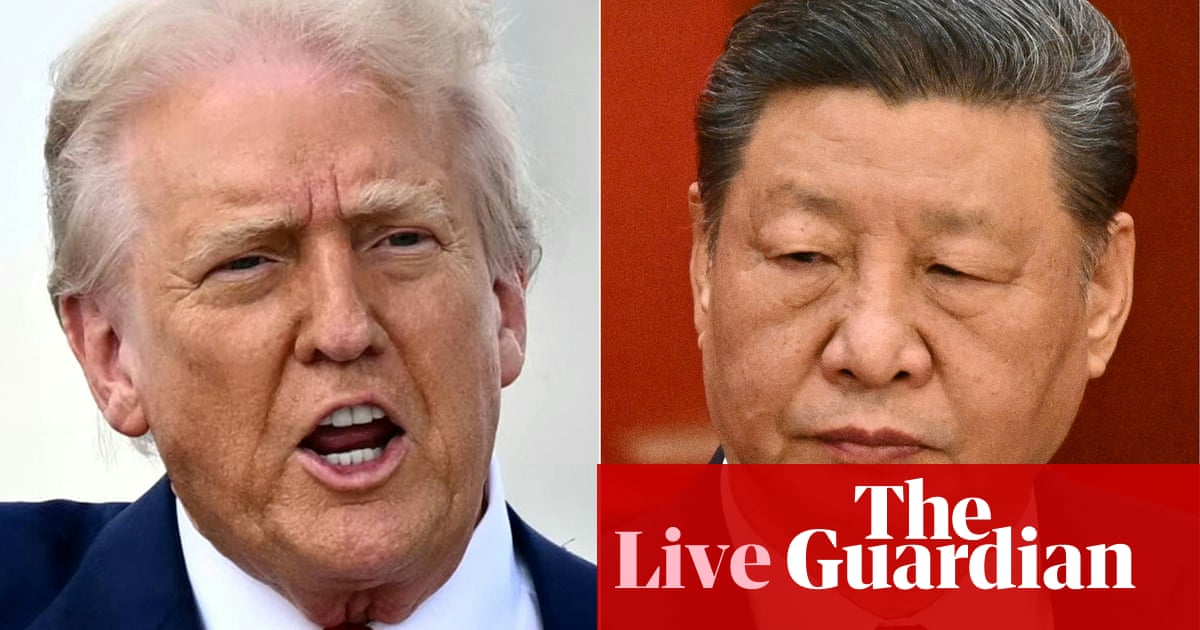Interim summary
Hello and thanks for following our live coverage of what has been a rocky few days on global markets following President’s Trump’s shock announcement of punitive reciprocal tariffs, and now a 90-day pause for most countries, with the exception of China.
Tensions between the world’s two largest economies escalated today with China’s 84% tariffs on US imports coming into effect just hours ago.
The move was in response to Trump’s decision to hike tariffs on China to 125%.
Here is quick recap of developments to bring you up to speed.
-
China’s countermeasures against the US came into effect just after midday in Beijing on Thursday in retaliation against Trump’s tariff hike on Chinese imports to 125%. Beijing has vowed to “fight to the end”, refusing to back down in the face of Trump’s efforts to bring the world’s governments to the negotiating table. The country’s commerce minister has described the tariffs as “a serious infringement of the legitimate interests of all countries”.
-
After days of seemingly doubling down on his position, Trump announced a 90-day pause on the proposed reciprocal tariffs for most countries, except China. Asked about his stunning U-turn, Trump said: “Well, I thought that people were jumping a little bit out of line. They were getting yippy. They were getting a little bit afraid.”
-
Asian markets, from Tokyo, to Hong Kong and Shanghai, responded positively to Trump’s tariff reprieve, with stocks rising across the board. The Hang Seng Index has climbed over 3%, or 632 points, to 20,896.95, while the Shanghai Composite Index jumped 1.29%, or 41.03 points, to 3,227.84.
-
Global markets also surged after Trump announced his 90-day tariff pause. The S&P 500 surged 9.5%, while the Nasdaq jumped 12%.
-
Despite the market rebound, the head of the World Trade Organization said the US-China tariff war could cut trade in goods between the two countries by 80%. Given the two economic giants account for 3% of world trade, the conflict could “severely damage the global economic outlook”, Ngozi Okonjo-Iweala said.
-
Addressing reporters at the White House, treasury secretary Scott Bessent said the latest changes in Donald Trump’s tariffs policy was Trump’s “strategy all along.” He said: “This was his strategy all along, and that you might even say that he goaded China into a bad position, they responded.”
-
China and the US have traded tit-for-tat tariff hikes repeatedly over the past week. “I want to emphasize that there is no winner in a trade war, and that China does not want a trade war. But the Chinese government will by no means sit by when the legitimate rights and interests of its people are being hurt and deprived,” an official of China’s ministry of commerce said in a statement on Wednesday.
-
The tariff reprieve has been welcomed in South Korea, Taiwan, and Vietnam, where governments have said the pause will allow them “breathing room” and time to negotiate with the Trump administration.
-
China and the European Union have exchanged views on strengthening their economic and trade cooperation in response to US tariffs, the Chinese commerce ministry said on Thursday. In a video call on Tuesday, China’s commerce minister Wang Wentao discussed with European trade and economic security commissioner Maros Sefcovic the restart of talks on trade relief and to immediately carry out negotiations on electric vehicle price commitments.
Key events
Not long after he slapped the world’s second-largest economy with a 125% tariff, Trump posted this message on Truth Social at 01:00 in Washington.
“What a day, but more great days coming!!!”
The president also raised eyebrows with another post earlier in the day, as the market was experiencing major swings.
“THIS IS A GREAT TIME TO BUY!!!” he wrote at 9.37am local time, prompting some Democrats to question whether the president was manipulating stock markets.
The US trade representative denied these claims saying the administration is “trying to reset the global trading system”.
Vietnam and the United States agreed to start negotiations on a reciprocal trade agreement, Hanoi said Thursday, hours after Washington delayed imposing an enormous tariff on the Southeast Asian manufacturing powerhouse, Agence-France Presse reports.
The United States was Vietnam’s biggest export market in the first three months of the year, but President Donald Trump hit it with a 46% duty as part of a global trade blitz announced last week.
After Trump paused the stiff new tariffs on Wednesday, Vietnam’s Deputy Prime Minister Ho Duc Phoc suggested the two countries “should soon negotiate a bilateral trade agreement… to promote stable and mutually beneficial economic and trade relations”, according to a statement on the government news portal.
Phoc has been appointed by top leader To Lam to negotiate with the United States on tariffs, and he met with US Trade Representative Jamieson Greer on Wednesday.
“The United States agreed that the two sides should initiate negotiations on a reciprocal trade agreement, which would include tariff agreements, and asked technical levels from both sides to begin discussions immediately,” according to the government statement.
Experts said the levy could seriously damage Vietnam’s growth model, which relies heavily on exports to the United States.
China consumer prices fall as Beijing battles persistent deflation
Consumer prices in China fell in March for the second straight month, Reuters reports citing official data, as the world’s second-largest economy struggles to boost spending and a trade war with the United States deepens.
While deflation suggests the cost of goods is falling, it poses a threat to the broader economy as consumers tend to postpone purchases under such conditions, hoping for further reductions in prices. A lack of demand can then force companies to cut production, lay off workers and potentially discount existing stocks.
The consumer price index – a key measure of inflation – was down 0.1% year-on-year in March, according to data released by the National Bureau of Statistics. The figure came in slightly lower than expected by analysts surveyed by Bloomberg, who predicted the index would remain unchanged. But the index’s decline narrowed from the 0.7 percent drop year-on-year in February. The prices of food, tobacco and alcohol fell by 0.6%.
The drop comes as Beijing seeks to boost domestic consumption, which has yet to recover to pre-pandemic levels and is further threatened by a trade war with the US.

Helen Davidson
Earlier this week Chinese state media and foreign ministry were spreading a clip of former US president Ronald Reagan in 1987, decrying tariffs as leading to retaliation and ultimately hurting the US economy, in obvious reference to Trump’s tariff regime.
Today they’re sharing a speech by former Chinese leader Mao Zedong.
“As to how long this war will last, we are not the ones who can decide,” he says. “It used to depend on president Truman, and it will depend on president Eisenhower, or whoever becomes the next US president. It’s up to them.”
“No matter how long this war is going to last, we will never yield,” he says to applause. “We’ll fight until we completely triumph.”
The clip is an excerpt of Mao’s speech to the closing session of the 1953 CPPCC political meeting. He’s referencing the Korean war, during which China supported the North and the US supported the South. But stripped of the specifics, China’s current foreign affairs spokeswoman, Mao Ning, suggests the rhetoric applies today.
“We are Chinese. We are not afraid of provocations. We don’t back down,” she said in the caption.
What impact will the tariffs have?
The head of the WTO said Wednesday that the US-China tariff war could cut trade in goods between the two countries by 80%.
Given the two economic giants account for 3% of world trade, the conflict could “severely damage the global economic outlook”, Ngozi Okonjo-Iweala said.
Analysts expect the levies to take a significant chunk out of China’s GDP, which Beijing’s leadership hope will grow 5% this year, AFP reports.
Likely to be hit hardest are China’s top exports to the United States – everything from electronics and machinery to textiles and clothing, according to the Peterson Institute of International Economics.
And because of the crucial role Chinese goods play in supplying US firms, the tariffs may also hurt American manufacturers and consumers, analysts have warned.
Paul Ashworth, chief North America economist at Capital Economics, said it was “difficult to see either side backing down in the next few days”.
But, he added, “talks will eventually happen, although a full rollback of all the additional tariffs… appear unlikely”.
China’s countermeasures come into effect

Helen Davidson
China’s countermeasures against the US have come into effect, raising tariffs on all US imports to 84% in retaliation against Trump’s tariff hike on Chinese imports to 125%.
The escalating trade war between the world’s two largest economies has reached extraordinary levels of cumulative tariffs and counter-tariffs, with neither side suggesting they’ll back down.
Beijing has vowed to “fight to the end”, refusing to back down in the face of Trump’s efforts to bring the world’s governments to the negotiating table.
China announced reciprocal tariffs of 34% in retaliation to Trump’s first round, on what he termed “liberation day”. Trump warned China to withdraw it or he would raise theirs again. China refused, and the two sides embarked on a series of tit-for-tat raises. With Trump pledging 125% against Chinese imports, Beijing said it would impose 84% on US products, now in effect. It has also put 18 US companies on trade restriction lists, among other countermeasures.
A China Daily editorial published last night says “caving in to the US pressure is out of the question for Beijing”.
“It is not that China does not understand what the unprecedentedly high tariffs mean for its exports and the economy in general. Profits of export-oriented industries will take a blow and the resulting decline in manufacturing investment and consumer sentiment will dampen economic growth.
“But it also knows that kowtowing to the US’ tariff bullying will gain it nothing, given that it is no secret the US is now intent on cutting China out of its consumer market and reshaping the global supply chains to serve its own narrow interests.”
China now appears to be approaching other nations in an apparent attempt to shore up trading agreements away from the US and its punitive tariffs. Markets responded positively to Trump’s pause, including in China. Major Chinese trading markets had mostly weathered the carnage seen across the world earlier this week, apparently due to government interventions.
Japan ‘strongly’ demands US reviews other tariffs
Japan’s government said Thursday it received US Donald Trump’s pause on new tariffs “positively” but still “strongly” demands that Washington reconsider other levies, AFP reports.
“We received the latest US announcement positively,” chief government spokesman Yoshimasa Hayashi told a regular briefing.
But he added: “We continue to strongly demand that the United States reviews measures on its reciprocal tariffs, tariffs on steel and aluminium, and tariffs on vehicles and auto parts.”
Trump’s announcement last week of sweeping “reciprocal” tariffs for a slew of countries included a 24% levy on imports from Japan, the world’s fourth-biggest economy.
Stocks in Indonesia, which was set to be slapped with a 32% tariff, have followed suit with other Asian markets, with the country’s benchmark stock index nearly 5% higher at the open on Thursday after Trump’s 90-day pause.
The Jakarta Composite Index was up 289.2 points, or 4.85%, to 6,257.18 shortly after markets opened on Thursday, two days after stocks tanked more than 7% in their biggest drop since 2011, Reuters reports.

David Smith
Republicans are quietly pushing a procedural rule that would curb the power of the US Congress to override Donald Trump’s chaotic tariff policy.
The House of Representatives’ rules committee on Wednesday approved a measure that would forbid the House from voting on legislation to overturn the president’s recently imposed taxes on foreign imports.
The sleight of hand was embedded in procedural rule legislation setting up debate on a separate issue: the budget resolution that is central to Trump’s agenda.
If adopted, the rule would in effect stall until October a Democratic effort to force a floor vote on a resolution disapproving of the national emergency that Trump declared last week to justify the tariffs. This mirrors a similar tactic used previously to shield Trump’s earlier tariffs.
The move came as Trump announced a major reversal on Wednesday, with a 90-day pause on tariffs for most countries while raising them to 125% for China.
Tariff reprieve provides breathing room, time for negotiations, say Korea and Taiwan
There have been sighs of relief in Asia after Trump announced his 90-day tariff pause, with South Korea’s top trade envoy Cheong In-kyo saying on Thursday the pause had provided room for negotiations, as the country seeks to reduce tariffs through talks.
Cheong met US trade representative Jamieson Greer about lowering tariff rates slapped on the country and delivered concerns about US tariffs, the trade ministry.
Meanwhile in Taiwan, which was due to be hit with a 32% tariff, the foreign minister Lin Chia-lung said the government was dedicated to increasing its purchases from and investments in the United States and to reduce the island’s trade surplus with its most important international backer.
“Now that we have an additional 90 days, we can discuss Taiwan-U.S. economic and trade cooperation in a more detailed and in-depth manner,” he said.
Taiwan President Lai Ching-te on Sunday pledged to seek a zero tariff regime with the US, and said that Taipei would not retaliate in response to the tariffs.










